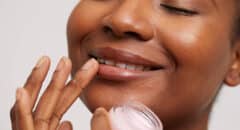
For many people, alpha hydroxy acids (AHAs) are an essential part of their skincare routines. AHAs can be great for reducing acne, smoothing the skin, reducing hyperpigmentation, and exfoliating. In some cases, these acids originate from natural sources, such as fruits, but cosmetic companies typically use synthetic versions. One, in particular, has been touted as a key component of healthy skincare, and it’s called glycolic acid. However, the experts want you to know that it might not be the best for Black skin.
What’s Glycolic Acid?
Glycolic acid is an AHA that can be found in fruits, beets, and sugarcane. Though cosmetic companies usually manufacture the glycolic acid they use, it’s still considered to be safe. They use glycolic acid in topical products that are supposed to help with different aspects of skincare. Glycolic acid has exfoliative properties, which means that it can remove the outer layer of skin cells without scrubbing.
It also attracts water to your skin so it can stay moisturized. Additionally, studies show that glycolic acid has antibacterial properties at certain concentrations, so it can hinder bacterial growth that can cause skin issues. Further studies suggest that glycolic acid can reduce sun damage and boost the collagen and hyaluronic acid in your skin. When that happens, you can experience better elasticity in your skin.
Thanks to all these properties, skincare products with glycolic acid are often recommended for managing issues like acne, sunspots, wrinkles, hyperpigmentation, lines, and warts. These can take the form of exfoliants, cleansers, toners, mists, serums, face masks, at-home peels, moisturizers, or acne treatments. You may get the most out of treatments that stay on the skin, though.
Despite all the benefits, however, skin experts are quick to point out that it’s not the best for darker skin tones.

RELATED: 5 Healthy Acids To Help Soothe Your Dry Skin
Why is it Bad For Black Skin?
Though glycolic acid can be good for the skin, it also has some potential risks. It can reduce the effects of sun damage, but since it does this by removing the top layer of skin cells, your skin can be more sensitive to the sun’s exposure. As such, it’s best to use sunscreen and limit sun exposure.
Another issue that you might experience after using glycolic acid is irritation. According to skin professionals, Black people are more likely to have irritated and inflamed skin after using a product with glycolic acid. Some of the signs of irritation include redness, inflammation, itching, swelling, and burning. If this happens, you should stop using the product immediately.
Interestingly, glycolic acid can be as likely to cause hyperpigmentation on Black skin as it is to reduce it for other ethnicities. This is especially true if you’re prone to developing hyperpigmentation in the first place. If you see dark spots after using products with glycolic acid, it’s best to stop using them.
RELATED: 3 Natural Remedies For Hyperpigmentation

Alternatives to Use in Your Skincare
If you’re still interested in using glycolic acid in your skincare routine, though, the experts recommend using a lower strength than you usually would. You could also use it less frequently. Instead of using the skincare products with glycolic acid daily, try using them once or twice per week. Since using multiple products with the acid as an ingredient can worsen the side effects exponentially, consider dropping to just one product.
Alternatively, you can skip glycolic acid altogether. Mandelic acid is another AHA that has similar skincare benefits. It’s used to manage acne, problematic skin texture, wrinkles, lines, and hyperpigmentation. Mandelic acid also has larger molecules than glycolic acid, so it doesn’t penetrate the skin as easily or cause as much irritation. Unlike glycolic acid, mandelic acid is also considered appropriate for people who have sensitive skin.
It’s important to note, though, that mandelic acid is still an AHA, so it has similar possible side effects. These effects can include redness, swelling, and itching. You’re more likely to see these issues if you overuse products that contain mandelic acid. You may avoid skin irritation if you use a weaker product or use it less frequently.
Your best bet, of course, is to switch to a different type of skincare product like beta hydroxy acids (BHAs). BHAs are chemical exfoliants that are great for people with oily or acne-prone skin as they penetrate the pores. The most common BHA is salicylic acid, and you can find it in many face washes and exfoliants.
Apart from removing debris, they can break through sebum to help keep your skin oil-free but moisturized. It also has anti-inflammatory and antibacterial properties that can make you less prone to acne and inflammation. Most importantly, BHAs have been shown to be gentler on Black skin.
However, BHAs can still cause skin irritation in those who have sensitive or naturally dry skin. Since they can remove the sebum that your skin produces to stay moisturized, BHAs can make skin irritation worse for those who are already dealing with dryness. In that case, it’s better to pair your use of BHAs with a moisturizer. If you’re not sure what to use, talk to your doctor about your options.
Though they’re not as popular, polyhydroxy acids (PHAs) are another type of cleanser you should know about. They have larger molecules than glycolic acid and are known to exfoliate the skin with little to no irritation. That’s because they lift away dead skin cells and encourage natural skin cell turnover.
They also encourage your skin to maintain its moisture because of their humectant nature. In addition, their antioxidant properties help to protect your skin from damage–especially when it comes to the sun. PHAs are great for smoothing an uneven skin tone and lightening dark spots with little to no risk of hyperpigmentation. Generally, PHAs can be used by anyone, even if they have sensitive skin.
If you’re looking for PHAs, three of the common ones are galactose, gluconolactone, and lactobionic acid. They’re in various skincare products but are most likely to be found in cleansers, toners, serums, and moisturizers.
Glycolic acid has its benefits when used for skincare, but that doesn’t mean it’s great for everyone. Black people, in particular, should use it with care or skip it entirely for other chemical exfoliants that don’t have significant side effects. If you have any concerns about mixing up your skincare routine, talk to your doctor first.









